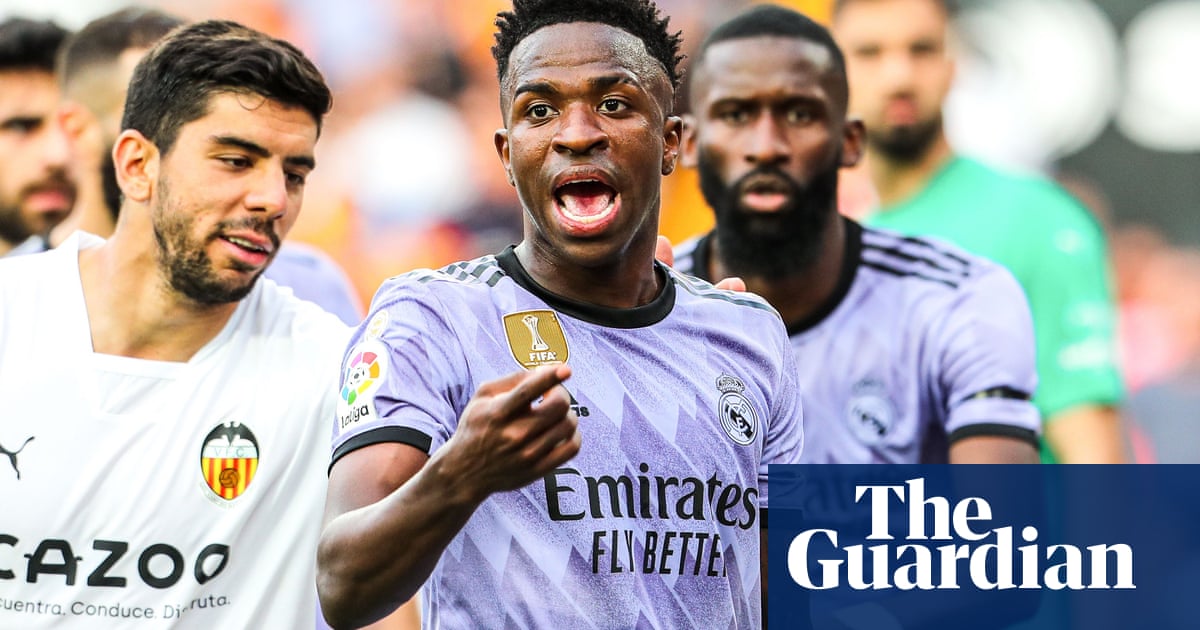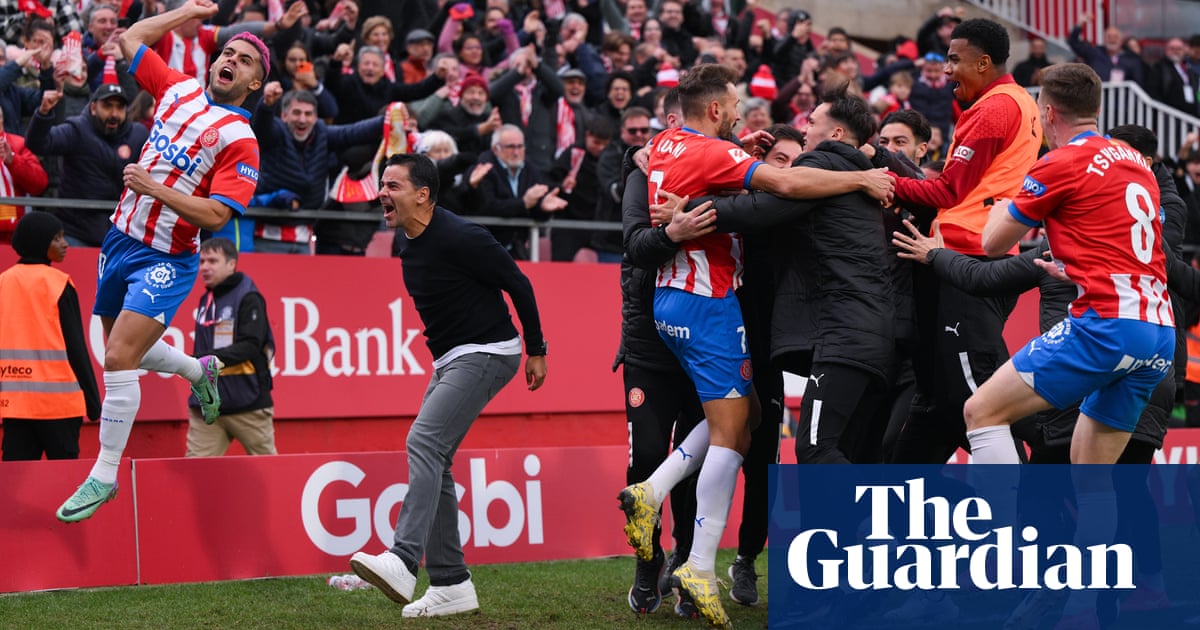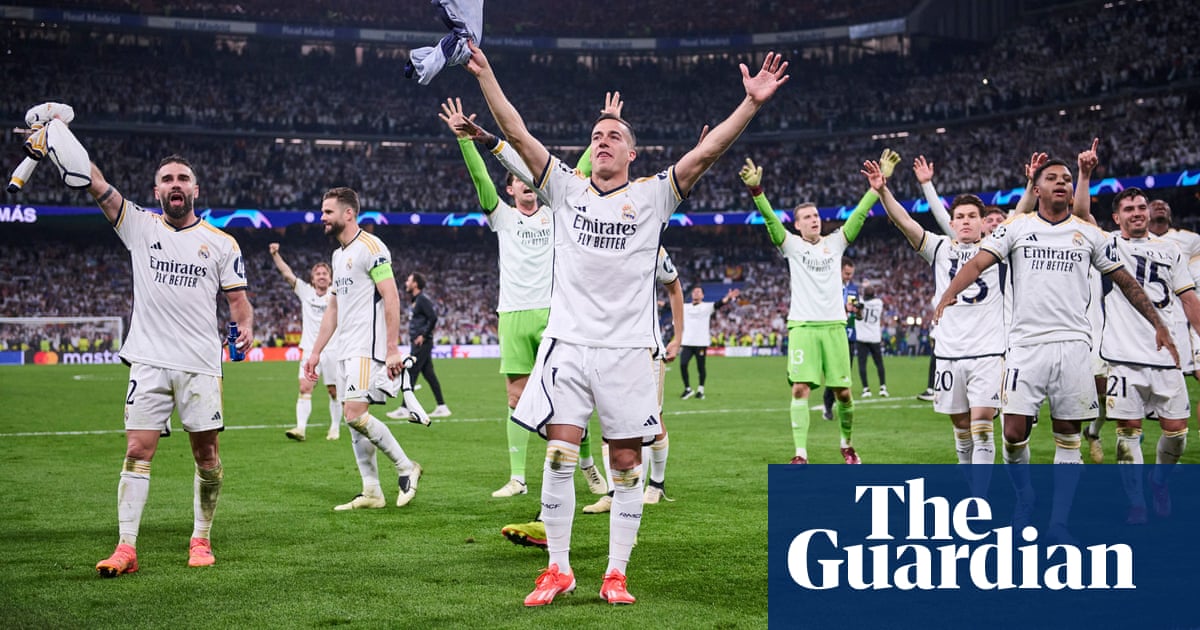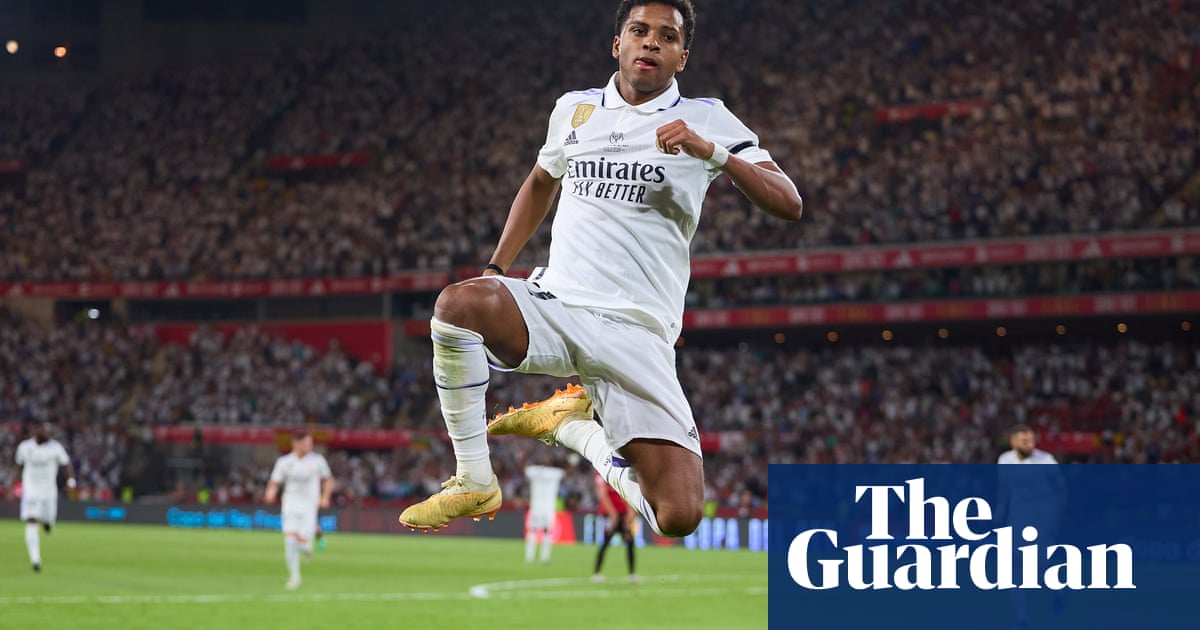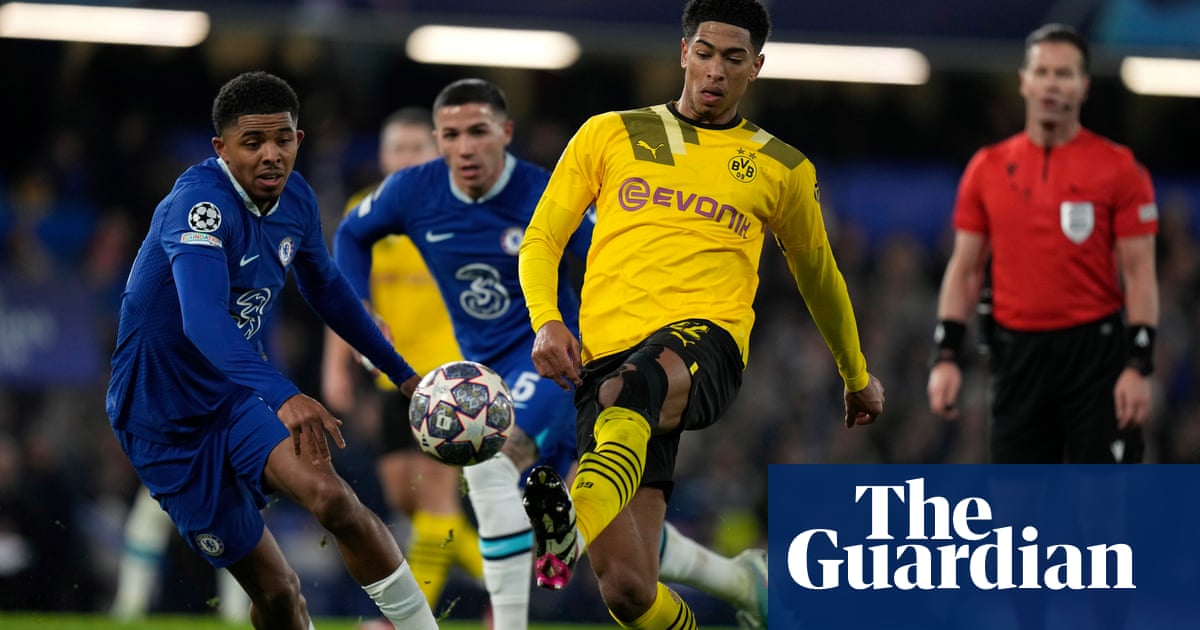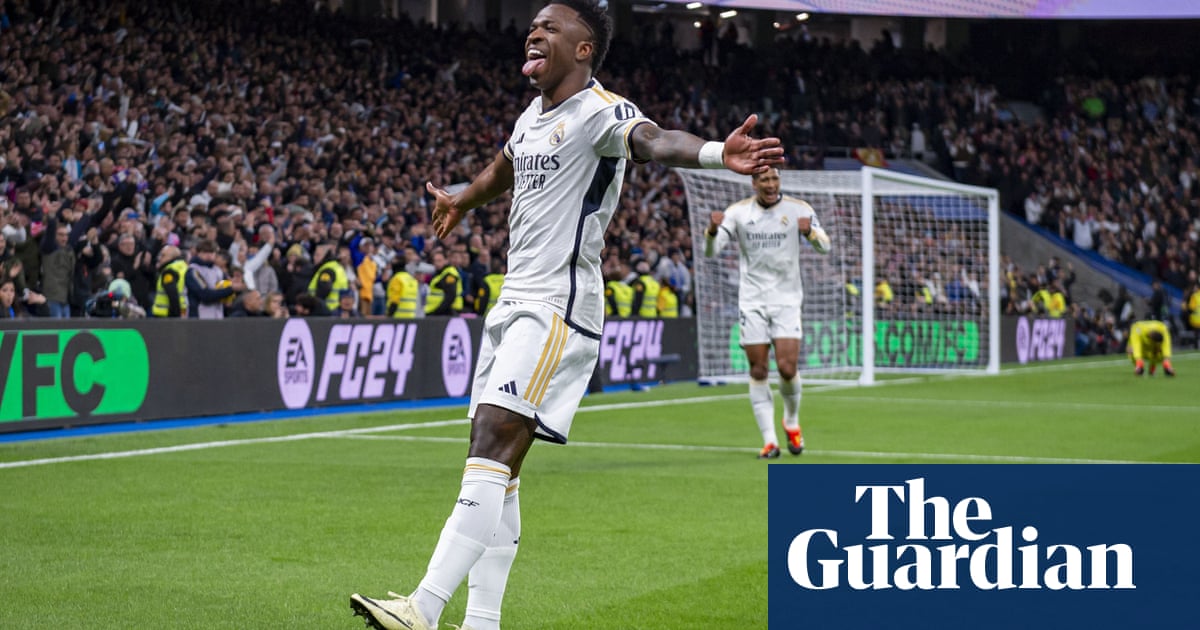
From his glass cell on the eighth floor of the Santiago Bernabéu, Girona’s coach, Míchel Sánchez, could make out Yan Couto way down there: he was the one with the pink hair in tears. This had been all set up to be their moment, history there to be made, a future too, but in the end it had just been too much. Real Madrid had been too much.
The man who came to console Couto when at last it was over certainly had: at full-time Vinícius Júnior approached and put an arm around his countryman, as if apologising for what he had done; for 77 minutes he had put him through the spin cycle.
Girona had come to chase a dream and encountered Real life. They turned up to fight to be champions but, Míchel said, they’d had their “faces painted”, reminded that this isn’t their league. Instead, it is Madrid’s. No one was actually going to say it was done, not with 14 weeks left, but Carlo Ancelotti did say his side had landed a hefty blow. They had done so when it mattered most. Saturday’s 4-0 win in La Liga’s unlikely title decider left them five points clear of Girona in second and, with Barcelona drawing and Atlético Madrid losing the following night, 10 and 13 above their traditional rivals, competitors that haven’t competed. “The best performance at the best moment,” Ancelotti called it.
“They’re at a very, very high level. If they continue like this it’s very hard to see it slip away,” Míchel said. He also said he could empathise with Couto, only 21 and a player he wasn’t about to ditch just because he had been done over by someone who had done over so many others, just because he was at the scene for all four goals and even the penalty Joselu crashed against the post with the last kick. This, after all, is simply the way it is sometimes. “We can’t come to the Bernabéu thinking we’ll overwhelm them; our level is not Madrid’s,” he admitted, a hint of relief there, as if liberated from a lie, the demands that his team do a Leicester. Not least because Leicester never had this lot in front of them. When did Danny Simpson ever have to deal with Vinícius doing this to him?
There was a moment during the Copa del Rey game against Atlético Madrid recently when cameras caught Vinícius ending one move by puffing his chest out, putting his hands to his mouth, shaking his head and saying: “I’m so good, madre mía, I’m so good!” A couple of minutes later, Antoine Griezmann scored a glorious goal to send Atlético through but if that left Vinícius looking a little silly, he wasn’t actually wrong. When El País called him a weapon this weekend, they didn’t mean it like that. And if Eric García did mean it like that when he called Vinícius the Ballon d’Or a couple of years ago, it’s no great leap to think he actually will be one day.
On days like this, especially. Asked to describe the Brazilian’s performance on Saturday night, Ancelotti replied: “Top. When he plays this way, at this level, with this attitude, in my personal opinion, he is the best in the world.”
There was a message in those words – when, with this attitude – which is a recurring theme. “We have spoken to Vinícius a lot,” Nacho Fernández said a couple of months ago. “As captain I, and other teammates, have told him to focus just on playing.” After the Super Cup final, Ancelotti admitted that he didn’t like Vinícius – and Jude Bellingham – doing backheels when the game was won. Afterwards, Vinícius admitted: “I’m sad because everyone wants to fight with me. Sometimes I talk too much or I do tricks that are uncalled for. The manager and my teammates are teaching me. I’m not a saint, but I want to improve, be an example for kids.” But that night Vinícius had scored a hat-trick to beat Barcelona 4-1 and that’s the bottom line.
The man they once laughed at scored 23 goals and provided 21 assists last season; the year before he provided 20 and scored 22, including the winner in the Champions League final. This year, despite injury, he has 12 goals and seven assists, the feeling that he is just getting up and running again – and when he’s up and running no one can catch him. There may be no player as electric, as exciting anywhere, no one as likely to destroy you and your dreams. Since he returned, he has played eight games, scored six goals and provided three assists. On Saturday, he scored one and provided two, although perhaps that should be three? He was involved in every goal as Madrid put four past Girona, the team no one else has beaten, on the night when Couto was dribbled past more times than anyone has ever been at the Bernabéu.
Vinícius was a bit of everything, of everyone. He scored the first with an outrageous shot rocketing into the net out of nowhere, as if he was Cristiano Ronaldo. Over on the touchline, he set up the second via a ridiculous pass with the outside of his boot, bent and perfectly weighted into the path of Bellingham, as if he was Luka Modric. Running at Couto, rolling the ball under his studs, flipping it from foot to foot – a croqueta they call it here, because that’s how you cook them – and nutmegging his man, he created the third, as if he was Neymar. And, while Rodrygo still had a long way to run, he it was with the penultimate touch, the man who hunted down and took it off Couto for the fourth, as if he was … erm, Gavi?
In short, he was too good. They all were. Madrid have suffered three ACL tears. Éder Militão has missed the entire season. So has Thibaut Courtois. They don’t really have a centre forward – Joselu, the only genuine striker, has started just nine of 24 league games – and they have not been sure of their goalkeepers either, Andriy Lunin and Kepa Arrizabalaga playing 12 games each. They went into Saturday’s game with Lucas Vázquez, a midfielder, at full-back and no centre-backs available at all – a world record, Ancelotti called it – because of injuries to Militão, David Alaba, Nacho and Antonio Rüdiger. Dani Carvajal has played there just twice in his career, Aurélien Tchouaméni four times. Madrid have won all four and not conceded a goal. “It’s like Carvajal has played 400 times,” Ancelotti said.
“In times of difficulty, emergency and need, the commitment is higher,” the coach added. He described this as a “humble” performance. “When a team has extraordinary quality with the ball, sometimes it can be hard to sacrifice yourself when you don’t have it. Today we had that from everyone, including those players who are there to make the difference. Quality is the most important thing. If you can combine the quality with commitment and attitude you get performances of a high level,” he said, genuinely coughing when he was asked what part he played in all this. “I do what I can,” he replied. “The key is always the players.”
Sometimes the simplest explanation is the best, even if it risks reductionism, even if Ancelotti’s determination to gently shift the attention says so much about him and why he is a success, even as it hides his hand. Why, when it came to it, did Madrid defeat Girona, the best team in Spain, as if the last few months haven’t even happened? Why have Girona lost only twice all season, both times to them and with an aggregate score of 7-0? Why, even when Madrid don’t dominate, do they deliver that blow? Why are they probably going to win the league? Watching them build a narrow wall in front of the centre-backs, denying Girona a single shot on target, was interesting. Seeing them cede possession in parts of the pitch and go man to man in others was too. But for all the analysis, there’s something basic: because they’re better. Because, even with the absences, they are very good footballers.
Yes, there is bias. Yes, he has to say this. And yes, of course there are other candidates – the obvious one is probably en route to join them. But look at this and ask: how wrong is he really? If Vinícius is the best player in the world, Ancelotti was asked, who’s next? “Bellingham,” he said. “Third? Rodrygo … Fourth: Kroos … Valverde, Camavinga … Today’s game was very good. Being on our bench today was very comfortable.”
Suspended and high up in the stand at the Bernabéu, watching in the box from where he could see the spaces all too well and Couto cry, it was different for Míchel, but there were no regrets and no recrimination. “They were better than us because they’re a great team,” he said. “The way they were today, it’s very hard to stop them. Camavinga, Vinícius, Bellingham, pfff … when you face someone this good, you see your own reality and this isn’t our league.”
No, it’s theirs.
Talking points
Oh, and Toni Kroos, by the way. Woof.
According to Catalonia Radio, at the end of Barcelona’s chaotic and sometimes catastrophic 3-3 draw with Granada, in which 16-year-old Lamine Yamal scored twice and produced another brilliant display to single handedly offer some sunshine amid the gloom, the club president Joan Laporta was so furious he threw a tray of canapés around the directors’ box. The vols really were au vent.
Carnaval in the bay and there was bad weather on the way, which isn’t how it’s supposed to be. “Cádiz have bought 10,000 rain jackets, which will be distributed in the event of rain,” the club announced prior to their game against Betis on Friday night. And, it turned out, redistributed in the event of a shower. And the team really are an absolute shower. Towards the end of another horrendous night, hundreds and hundreds of the yellow, plastic rain jackets – really just bin bags with holes for the head and arms – were thrown on to the pitch in protest, swirling around in the wind and forcing the referee to bring the game to a premature end. Which was no great loss: defeated 2-0, they had seen more than enough. What they haven’t seen is their team win – it’s five months now since Cádiz beat anyone. “It’s time to gaze at our navels,” striker Chris Ramos said, maybe getting the metaphor slightly wrong.
Live by the sword, die by the sword and all that. During Celta Vigo’s visit to the Coliseum on Sunday afternoon, Luca de la Torre wiped out the Getafe coach, José Bordalás. It wasn’t his fault – he had been pushed by Mason Greenwood – but he sent Bordalás crashing to the floor, from where it took him a long time to get up again, a concerned crowd gathering around him. Eventually, Bordalás could laugh about it, not least because his team had done it again. “That’s football too, daddio,” he said after his side had gone 2-0 up, been hauled back to 2-2 and won 3-2 with a late winner from Jaime Mata. Celta were awful until they put Iago Aspas on, which probably won’t surprise anyone.
This time last month, Isaac Romero was playing for Sevilla’s youth team Sevilla Atlético against El Palo in Group 4 of Spain’s Segunda RFEF, the country’s fourth tier. And even fourth tier is being generous: there are 40 teams spread across two groups in Primera RFEF and 90 teams spread across five groups in Segunda RFEF. So, in fact, is calling it Sevilla’s youth team – at least in his case. He was 23. A month on, called in as the emergency got worse, he has scored five and provided one assist in seven first-team games. The latest was this Sunday – and it was the winner they so desperately needed against Atlético Madrid, the place going wild at full-time. They hadn’t seen their team win at home since September. “It was about time,” Isaac said. Óliver Torres added: “We had gone a long time without winning here; we needed this. Isaac is a discovery: he’s a good teammate, humble, a good lad, and luck is smiling on him.”
As for Atlético, Jan Oblak described this defeat – their sixth away from home – as a story “that keeps getting repeated”.
At the end of Las Palmas’s 2-0 win at Valencia, Kirian Rodríguez turned up wearing a shirt with the name Marc on the back. Marc was a Dutch Las Palmas fan who, like Kirian, had suffered cancer. He passed away recently and was buried with Kirian’s shirt.




